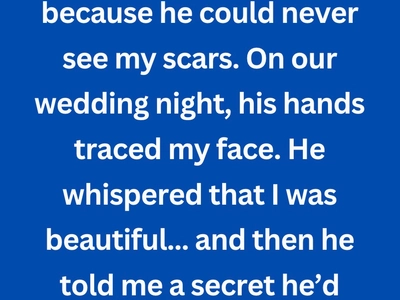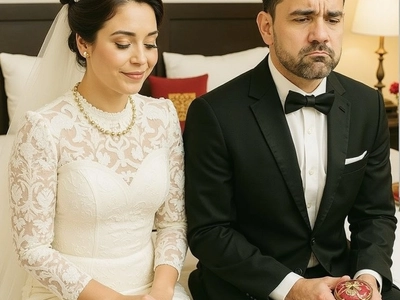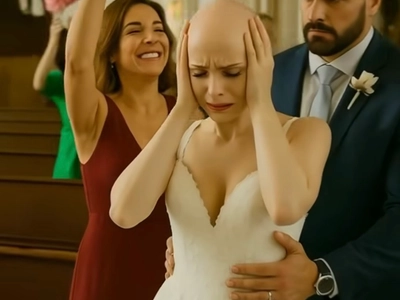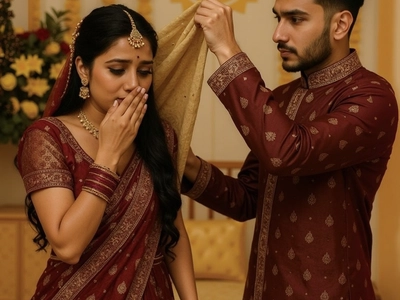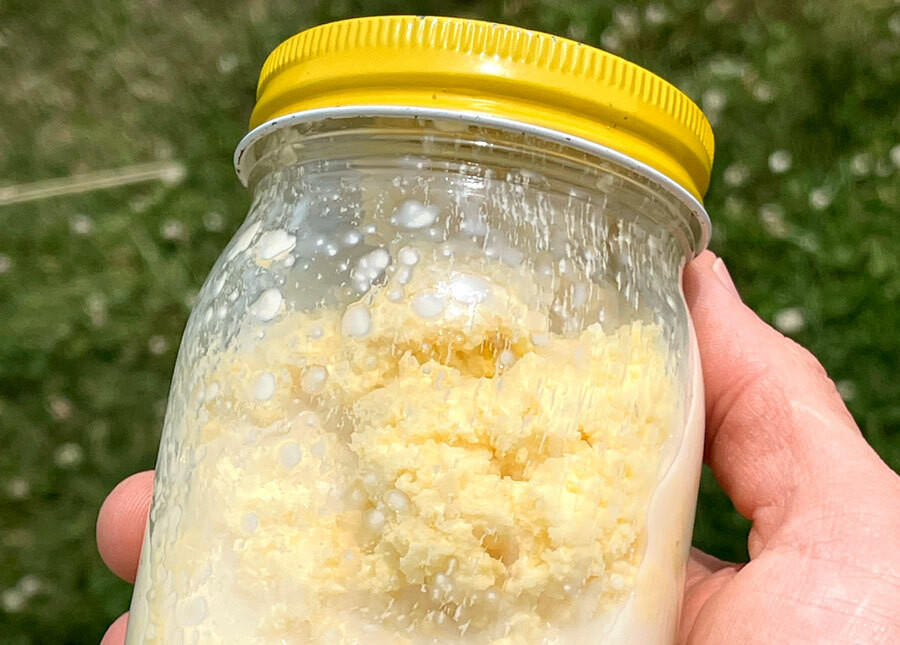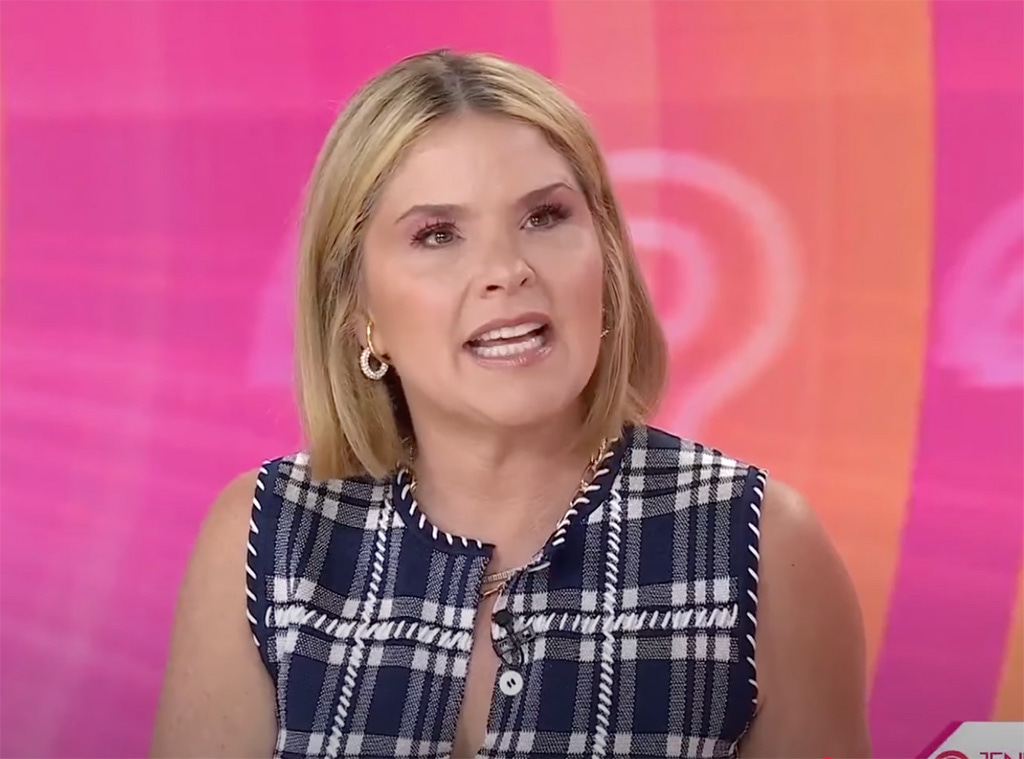I Married a Blind Man Because I Believed He Couldn’t See My Scars — But On Our Wedding Night, He Whispered Something That Froze My Soul
When I was twenty, life changed in a way I never expected. A gas explosion in the kitchen left me burned, scarred, and marked forever. My face, neck, and back carried the evidence of that day, and though the doctors saved my life, they couldn’t save me from what came after. People didn’t look at me the same anymore. Their eyes were full of pity, sometimes fear, sometimes even disgust they tried to hide but couldn’t. I stopped being a young woman with dreams and became “the girl with the scars.” Every mirror reminded me. Every glance from strangers pressed it deeper into my skin.
For years, I told myself I had to accept it—that love was no longer for me, that my future was only about survival, not happiness. Men avoided me, or when they did approach, it was out of charity, never out of desire. I learned to walk fast in public, to hide beneath scarves and makeup that never really covered anything. I laughed less. I spoke less. My life became a shadow.
And then I met Obinna.
He was a music teacher, blind since childhood. He lived in a world of sound, not sight, and when he first spoke to me, his head turned slightly as if he were following a melody only he could hear. His voice was calm, deep, and full of warmth. He didn’t flinch when I answered. He didn’t study my scars. He simply listened, smiled, and said my voice was like the wind before a storm—soft, steady, and carrying secrets.
For the first time in years, I felt something shift inside me.
We began talking after that, small conversations at first, about work, about his music, about my love of books. He asked questions no one else had asked in a long time. He wanted to know what made me laugh, what frightened me, what I dreamed about when I was little. He didn’t want to know what happened to my face, or how the accident occurred. He wanted me, not my story.
We dated for a year, and every day with him felt like a new song. He taught me how to listen deeply, how to find comfort in silence, how to trust that even if the world was cruel, one person could be gentle. When he proposed, my heart almost stopped.
Of course, the world wasn’t kind. People laughed at me, whispered cruel things. “She married him because he can’t see how ugly she is!” they said. Their voices followed me like shadows. But I only smiled. For once, I had an answer. “I’d rather marry a man who sees my soul than one who judges my skin.”
Our wedding was small, simple, filled with live music from his students. My dress was high-necked, hiding what I always tried to hide. But for the first time, I didn’t feel ashamed. Standing beside Obinna, I felt seen in a way I had never been before—not with eyes, but with love.
That night, in our small apartment, everything changed again.
He touched my face slowly, tracing the lines of my scars as if they were music notes. He whispered, “You are even more beautiful than I imagined.” Tears slipped down my face. But then he added words that froze me.
“I’ve seen your face before.”
My breath caught.
“You… you are blind,” I said.
He nodded. “I was. But three months ago, I had delicate surgery in India. My sight is not perfect, but I can see shapes, shadows… faces. I didn’t tell anyone. Not even you.”
“Why?” I whispered, my chest tightening.
“Because I wanted to love you without the noise of the world. Without pressure. Without seeing you the way they did. I wanted to know if my heart truly chose you. And it did. When I finally saw your face… I cried. Not because of your scars, but because of your strength.”
He had seen me. Truly seen me. And still chose me.
That night, I held him tighter than I had ever held anyone. His love wasn’t born of blindness—it was born of courage.
The next morning, I woke to the sound of his guitar, the gentle strumming filling the air. Sunlight slipped through the curtains, touching his face. For a moment, I forgot everything else. I was a wife. I was loved. But the memory of his confession lingered.
“Obinna,” I asked softly, “was that really the first time you saw me? That night?”
His hands stilled on the strings. He hesitated. Then said, “No. The first time I really saw you was two months ago.”
My heart raced. “Where?”
“In the garden near your office,” he said. “I used to sit there after my therapies, listening to the birds. One afternoon, I saw a woman on the bench across from me. She wore a headscarf, and her face was turned away. But then a child dropped a toy. She picked it up and smiled.”
I remembered that garden. I used to sit there after work, crying quietly, hiding from the world.
“When the light touched her face,” he continued, “I saw scars. But I didn’t see scars. I saw warmth. I saw pain, but also beauty. And then she hummed a tune—softly, nervously. The same tune you always sing. That’s when I knew it was you.”
My throat tightened. Tears blurred my sight. “Why didn’t you say anything?”
He placed his guitar down and held my hand. “Because I wanted to be sure my heart heard you louder than my eyes ever could.”
I broke then, sobbing into his chest. All those years I had believed I was unworthy, invisible, broken. And yet he had seen me in my hiding place, and still he loved me.
That day, we walked together to the garden. And for the first time, I took off my headscarf in public. People stared, but for once, I didn’t flinch. I held Obinna’s hand tighter and lifted my chin.
A week later, a package arrived. A photo album from Obinna’s students—a surprise wedding gift. I hesitated to open it. I feared the camera had caught what I tried so hard to hide. But Obinna insisted.
So we sat on the floor and flipped through the pages. At first, I smiled. The photos were full of laughter, music, joy. Then I came across one picture that stopped my breath.
It wasn’t posed. It wasn’t polished. It was me, standing by the window, sunlight brushing my face. A single tear ran down my cheek. It was raw, unguarded. Beneath the photo, in small handwriting, was a note:
“Strength wears scars like medals.” —Tola, Photographer
Obinna touched the photo gently. “This is the one I’m framing,” he said.
I protested. “Don’t you want the one where I’m smiling?”
He shook his head. “That one is beautiful. But this one is honest. It shows how far you’ve come. It shows the truth.”
Later that night, I called the photographer to thank her. Her voice was warm, gentle. “You may not remember me,” she said, “but four years ago, at the market, I fainted. I was pregnant. People passed me by. But you helped me. You stayed with me.”
I gasped. I barely remembered.
“You didn’t see me then,” she continued, “but I remembered your kindness. So when I saw you at the wedding, I knew I was photographing a woman who had no idea how beautiful she really was.”
I hung up and cried again—not out of pain, but from healing.
All those years I believed I was invisible. Yet people had been watching, remembering. Obinna, the photographer, strangers who saw not scars but kindness.
For the first time since the explosion, I believed I could live, not just survive. And I could love without fear.
Obinna’s eyes may not be perfect, but they are the only ones that ever truly saw me.
And because of that, I finally see myself.
